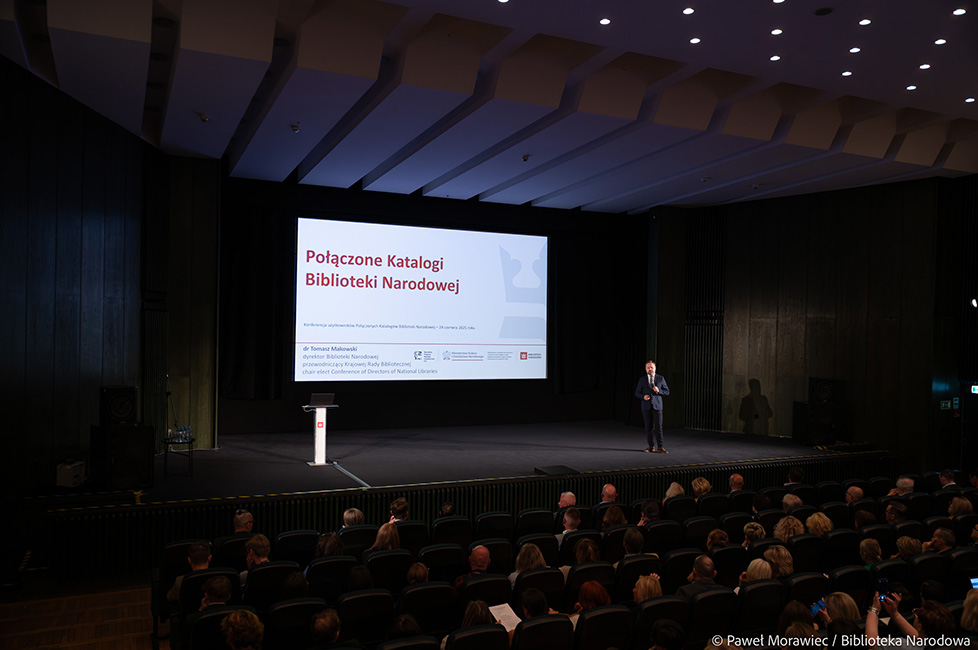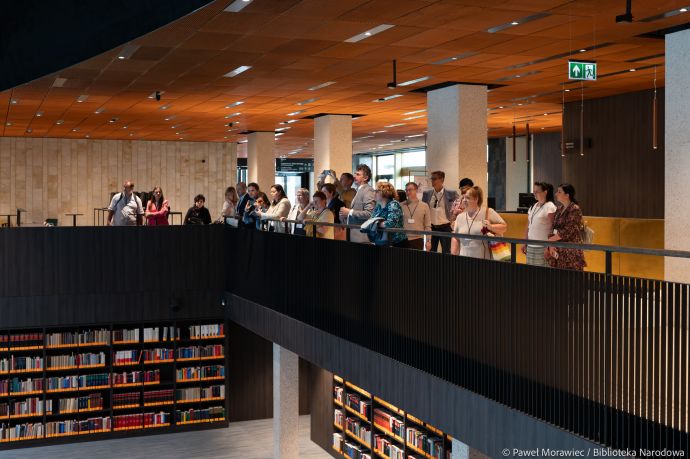Conference of Users of the National Library Union Catalogue: One system, many benefits

Some 250 representatives of public, academic and specialist libraries from all over Poland – active users of the Alma system and Primo search engine – attended the Conference of Users of the National Library Union Catalogue on Tuesday, 24 June 2025 at the National Library. The event was an opportunity to reflect on the implementation of Poland’s integrated library resource management system, discuss its impact and share user experiences.
The Conference confirmed that common standards and tools significantly improve the work of libraries across Poland. It was not only a space for exchanging experiences, sharing knowledge and strengthening cooperation, but also for demonstrating new system features.
Apart from the benefits of shared cataloguing, one of the most important features of the Alma system, mentioned by librarians from both large and small libraries, is that it offers free access. There is no charge for using the system, server maintenance, implementation, subscription, service, updates, licences, data export and import, technical support, backup, IT staff or training. The allows libraries to make significant budget savings. The National Library, as the operator for Priority 1, Intervention Direction 1.2. Building a nationwide library network by means of an integrated library resources management system – part of the “National Reading Development Programme 2.0. for 2021-2025” – covers all costs of implementing and maintaining the system. For libraries involved in the shared cataloguing from the outset, the Alma system has been free of charge since 2019.
The plenary session of the Conference was opened by Dr Tomasz Makowski, Director General of the National Library, who spoke on the current status of the National Library Union Catalogue and its future prospects. In his speech, he emphasised the role of the shared library platform as a tool facilitating access to knowledge and integrating the library community in Poland. He thanked the libraries for their partnership and highlighted their contribution to getting the system up and running. Alma is currently used by 899 libraries in Poland (including 153 main libraries, 674 branches, library departments, faculty and institute libraries, and more than 70 libraries contributing to regional bibliographies and the indexing of press articles). Five of these libraries – at the University of Wrocław, Adam Mickiewicz University in Poznań, and Warsaw University of Technology, as well as the Raczyński Library and the Municipal Library in Łódź – will begin full cooperation in September this year. Alma is used by over 2,700 libraries worldwide. Poland has the largest network of libraries using the system in the world, just behind the United States, United Kingdom and Australia, and leads the way globally in its continuous improvement of the system.
Dr Makowski emphasised the importance of ensuring library data security, selecting a reliable and reputable software provider, and using a uniform database. Alma is not a metadata hub, but rather a system with a single shared database. The scale of its success is evidenced by the number of visits made to the National Library Catalogue and the Union Catalogue – almost 240 million last year, the highest in the history of library catalogue use in Poland.
Next to take the floor was Tomasz Zacharski, Deputy Director at the Jagiellonian Library. He spoke about how the largest university library in the country uses the Alma system and the challenge of integrating catalogues. For the academic community, the shared system above all provides a unified record of holdings and offers integrated access to information. It establishes an efficient working environment and is a tool for promoting and providing access to the Jagiellonian Library’s resources for users from Poland and around the world. It also represents a basis for innovation. Mr Zacharski also discussed the description and cataloguing of collections; only 4-5% of descriptions of new legal deposit copies are produced by the Jagiellonian Library, the rest being taken directly from the National Library Union Catalogue.
An international perspective on Alma was presented by Bettina Forster, Europe Director of Clarivate, who discussed cooperation with the National Library in developing a nationwide library network. In her speech she highlighted the uniquely effective methodology devised by the National Library for implementing the system in different types of libraries, and how the National Library Union Catalogue came into being. She also outlined future plans for software development.
Kacper Trzaska, Deputy Director at the National Library responsible for implementing the system in over 150 libraries in Poland, presented examples of the effective use of Alma by librarians in their day-to-day work, both for cataloguing items and making them available. Based on his own experiences, he shared analyses and ready-made solutions that libraries can use to improve how they manage their collections and increase their online visibility. He encouraged participants to learn about the new features of the system and adopt effective practices from co-cataloguing partners in the Union Catalogue. He also invited them to participate in the daily consultations provided by the staff of the Bibliographic Institute and the Subject Cataloguing Department at the National Library.
Mr Trzaska’s speech was followed by a series of presentations by speakers on their experience implementing the Alma system in different types of libraries. The speakers were: Agnieszka Podrazik, Deputy Director of the Stanisław Staszic Main Library of the AGH University of Science and Technology in Krakow, who spoke on technical libraries; Dr Dorota Sidorowicz-Mulak, Deputy Director of the Ossoliński National Institute for the Ossolineum National Library, on historical libraries; Mariusz Gabrysiak, the official representative of the Director of the Tadeusz Mikulski Lower Silesian Public Library in Wrocław, on provincial libraries; and Dorota Abramczyk, Director of the Bolesław Prus Municipal and District Public Library in Zgierz, on municipal libraries.
The speakers shared their experiences with data migration and deduplication, employee training and integrating services for readers. They pointed out that thanks to the cooperation and professional bibliographic descriptions available in the unified database, they can now focus more on their institutional duties, expand their regional bibliographies and save time overall. The benefits of the system for readers were repeatedly emphasised, as was the issue of data security within the system. The speakers thanked the National Library for its continuous support during and after the implementation phase. They noted that the National Library staff not only provide ongoing consultation, but also a whole series of free training sessions and materials.
Some speakers also drew attention to the complexity of Alma, owing to its coverage of all library processes within a single system – from acquisition, cataloguing, access and interlibrary loans to advanced statistics – and its ability to manage both physical and electronic resources. This comprehensive spectrum of services makes it suitable for all types of library, from large academic and public libraries to tiny libraries run by a single person.
The long-awaited highlight of the programme was the workshops on specific topics, run by experts from the Bibliographic Institute at the National Library. Participants could choose between five topics, with sessions running in parallel:
- Using National Library records in Alma to quickly build a catalogue and a regional bibliography
- Using Alma to prepare statistical reports and control lists
- Generating inventory books, loss reports, readers’ cards and other documents in Alma
- Preparing bibliographic records in Alma
- Using the reader app and Primo search engine, and presenting new acquisitions and popular publishing series in Primo
The well attended workshops were an important educational and community-building component of the Conference. They provided a forum for discussions and for identifying solutions that facilitate the work of librarians and reader services.
From the presentations, workshops and informal discussions it was clear that the libraries are working in partnership and have established a lasting community. The fact that so many different libraries were represented indicates a growing interest in the shared cataloguing platform and in expanding cooperation between institutions. It was evident that shared technological and cataloguing solutions improve the quality of library services; by cooperating with the National Library, even the smallest institutions can now use the same tools as the biggest libraries in the world – at no cost, and with professional support.
Accompanying events for participants included a tour of the modernised reading rooms of the National Library and a visit to the Palace of the Commonwealth, where the most valuable items from the National Library’s collections are exhibited. The tours were led by Dr Maciej Szablewski, Head of the Collection Access Department, and his deputy Daniel Biedrzycki. In the evening, participants were invited to the Skrzydła Dedala Literary Award Gala.
A follow-up meeting of Alma users, featuring themed workshops, is planned for this autumn.

